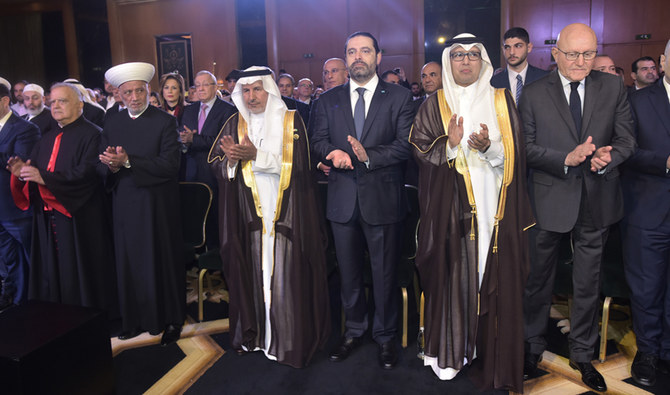BEIRUT: The general supervisor of the King Salman Humanitarian Aid and Relief Center (KSRelief), Dr. Abdullah Al-Rabeeah, signed on Wednesday seven agreements with Beirut and international and civil organizations operating in Lebanon to implement relief projects targeting Syrian and Palestinian refugees as well as the most affected host communities in Lebanon.
Lebanese Prime Minister Saad Hariri, who participated in the symposium at the Four Seasons Hotel Beirut to sign the agreements, praised the strong Saudi-Lebanese relations, which have existed for decades, and stressed Lebanon’s keenness to ensure their permanence and development.
He said: “The meetings Al-Rabeeah has held with different Lebanese political and religious authorities over the past two days during his visit to Lebanon, under the guidance of King Salman, indicate the Saudi leadership’s true desire to deepen the fraternal ties with the Lebanese, support Lebanon’s unity, independence, sovereignty and coexistence formula, and protect its existence from the repercussions of all the fires, crises and interventions that plague many countries.”
During the symposium, which was attended by a large group of political, religious and social figures, Al-Rabeeah called on the international donor community to shoulder more responsibility.
Addressing the implementing bodies, he said: “It is time to reconsider your working mechanisms in order to develop them and improve procedures to avoid negative impacts.”
“What I mean by reconsidering working processes is that there is a need to work professionally and skillfully because there are not many resources, and we must eliminate bureaucracy and speedily make the most of resources,” Al-Rabeeah told Arab News.
He stressed the importance of developing a close partnership between the donor and the implementer of projects, highlighting that KSRelief’s work is subject to international and regional oversight mechanisms as well as its own internal control mechanisms.
“We have two strategic partners, and when agreements are signed with the recipients of assistance, this means accepting oversight terms,” he said.
Al-Rabeeah said: “Saudi Arabia supports the safe return of Syrian refugees to their country, and so is the case for Yemen.”
“Saudi Arabia has supported peaceful dialogues, which restore security and stability,” he said. “In order for this to happen in Syria, we support the efforts of the United Nations and implement (as KSRelief) relief programs inside Syria. We also have major programs and we count on the UN to ensure a safe return for Syrian refugees.”
On the Syrian regions in which KSRelief is implementing its programs and the difficulties faced, Al-Rabeeah told Arab News: “We have nothing to do with military or religious matters, and wherever there is security, we work. We also work through the UN and the international organizations inside Syria, and we do not have any hidden agenda in this field.”
He stressed that “participating in rebuilding Syria requires security and stability, and the Saudi leadership hopes for a peaceful solution as soon as possible. Until this is achieved, the relief work will continue and won’t cease.”
Al-Rabeeah announced that KSRelief is implementing a quality program to rehabilitate recruited children in Yemen alongside its education, protection, health and environment projects.
“There are those who recruit children to fight in Yemen, violating all humanitarian laws. Our center rehabilitates them so that they are not used as terrorist tools in the future,” he said.
Al-Rabeeah emphasized that Crown Prince Mohammed bin Salman’s Vision 2030 has given relief work its share, especially in terms of volunteering programs. “We have great examples involved in the field,” he said.
Among the signed agreements was one with the Lebanese High Relief Commission (HRC) to carry out a project to cover the food needs of Lebanese families.
Chairman of Lebanon’s High Relief Commission Maj. Gen. Mohammed Khair told Arab News that the agreement targets distributing 10,000 food rations to orphans, widows and destitute families in the poorest and most disadvantaged areas in Lebanon. “This project is encouraging and gives hope to people,” he said.
Khair said that there are 100,000 people in need in Bab Al-Tabbaneh district alone, pledging to commit to transparency during the implementation of the project. “It is not a question of sectarian balance; we are focused on those who are most in need,” he said.
The signed agreements include one for repairing, equipping, and operating the Prince Nayef bin Abdul Aziz Center for Dialysis at the Makassed General Hospital, an agreement with the UNHCR worth $5 million to implement a project for assisting the most affected Syrian families for six months, an agreement to support Souboul Assalam Association in Akkar (northern Lebanon), an agreement with the International Organization for Migration (IOM) to implement a project worth $3.8 million to cover the needs of Syrian families that are below the poverty line for a year, and an agreement with UNRWA to cover the medical needs and treatment of cancer and multiple sclerosis in Palestinian refugee camps in Lebanon.
UNRWA Commissioner-General Pierre Krahenbuhl said: “The challenge facing UNRWA after the reduction of its budget is maintaining the operation of its 715 schools in the Middle East.”
“Saudi Arabia is a key partner for us, and owing to its help, we will be able to help cancer and multiple sclerosis patients,” he said.
















